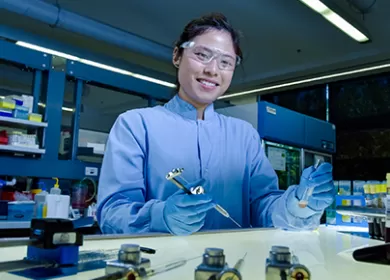Trained killers to join cancer fight
Researchers from the Australian Red Cross Lifeblood are collaborating with the Westmead Institute for Medical Research to trial a revolutionary treatment for people whose cancers have returned and who currently have little hope of a cure.
Despite many advances in cancer treatment, most people whose leukaemia or lymphoma returns after they have received a stem cell transplant will die of their disease. However, a new treatment, known as CAR-T cell therapy, allows a person’s own immune cells to be ‘trained’ to attack specific cancer targets and holds promise for these patients.
Dr Barbara Bell, National Donor Vigilance and Clinical Research Manager, Research and Development, explains: “In this study, our colleagues at Westmead will ‘teach” immune cells to seek and destroy cancer cells”.
“A type of immune cell known as T lymphocytes, will be extracted from whole blood provided by the patient’s original bone marrow donor. The cells will then be modified outside the body so that they produce, on their surface, an antibody that reacts specifically with cancerous B cells”
“The modified cells, known as CAR-T cells, will then be injected into the patient. We hope that these ‘trained killer cells’ will multiply in the patient and keep the cancerous cells in check.”
The Lifeblood has been approached by Dr Kenneth Micklethwaite of Westmead Hospital to support the trial by collecting whole blood from stem cell donors in a Current Good Manufacturing Practice environment, which the Australian Red Cross Lifeblood is in an ideal position to do. Over a two-year period, approximately 20 donations will be collected for twenty patients. The first two patients have already been treated on the trial.
Professor David Irving, Director, Research and Development, is excited about the possibilities of this work.
“It fits directly into our strategic intent to be collaborative, curious and use the expertise of our highly skilled Research and Development team for the benefit of patients,” David said.

